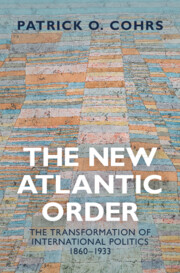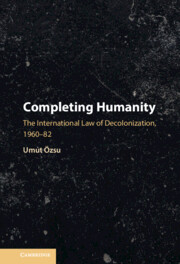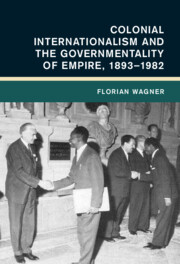 |
| Source: CUP |
Description:
Awards:
Winner, 2023 PROSE World History Award, Association of American Publishers
Website of the European Society of International Law's Interest Group on the History of International Law.

 |
| Source: CUP |
 |
| Source: CUP |
Abstract:
In light of the 150th anniversary of the Institut de Droit international, a book has been published on its history and work. It contains 45 chapters (16 FR, 29 EN) written by several of its members. Part I focuses on its evolution through a historical lens and the role it has played so far, discussing its mission, composition, codifying role, external relations, dissemination, and the interaction of private international law and public international law. Part II focuses on its contribution to the codification and development of international law in different areas: settlement of disputes, sources, ius in bello and ius ad bellum, individual and collective human rights, regulation of spaces, and harmonization of private international law. The book addresses the challenges and controversies that arose in the course of the work; the resolutions adopted, their impact and the way forward. It concludes with the position of the Institute in today’s world and its future.
Table of contents:
I. THE EVOLUTION OF THE INSTITUT DE DROIT INTERNATIONAL AND THE ROLE IT HAS PLAYED DURING ITS 150 YEARS OF EXISTENCE
- Les premiers temps de l’Institut de Droit International (1874–1913)
Jean SALMON
- The Institut de Droit International during the Inter-War Period (1919–1937)
Laurie MÄLKSOO
- The Institut de Droit international in the Cold War: Aspects of Public International Law (1947–1991)
Martti KOSKENNIEMI
- L’Institut de Droit international et le phénomène colonial
Georges ABI-SAAB et Fatsah OUGUERGOUZ
- The Institut de Droit international in Today’s World
Hilary CHARLESWORTH
- La perception du travail de codification par l’Institut de Droit international à travers le temps
Alain PELLET
- Four International Law Sisters (IDI, ILA, Hague Academy and ILC): Similarities, Differences, and Interactions
Nico SCHRIJVER
- La composition de l’Institut de Droit international à travers le temps
Pierre D’ARGENT
9 The Contribution of the Institut de Droit international to the Dissemination and Teaching of International Law
Antonio Remiro BROTÓNS
- L’interaction entre le droit international privé et le droit international public : son impact sur le travail de l’IDI
Diego P. FERNÁNDEZ ARROYO
II. THE CONTRIBUTION OF THE INSTITUT DE DROIT INTERNATIONAL TO THE CODIFICATION AND DEVELOPMENT OF INTERNATIONAL LAW
A. THE CONTRIBUTION OF THE INSTITUT DE DROIT INTERNATIONAL TO THE PEACEFUL SETTLEMENT OF INTERNATIONAL DISPUTES
- Arbitration between States
Raúl Emilio VINUESA
- International Judicial Settlement
Abdulqawi YUSUF
- Investment Arbitration
Stanimir ALEXANDROV
- Non-Adjudicative Dispute Settlement Means
Rüdiger WOLFRUM
B. THE CONTRIBUTION OF THE INSTITUT DE DROIT INTERNATIONAL TO THE CLARIFICATION OF THE SOURCES OF INTERNATIONAL LAW
- Law of Treaties
Georg NOLTE
- Identification of Customary International Law
Peter TOMKA
- Of Fragments, Concepts and Missions: General Principles of Law
Jorge VIÑUALES
C. THE CONTRIBUTION OF THE INSTITUT DE DROIT INTERNATIONAL TO THE LIMITATION OF THE IUS AD BELLUM AND THE EVOLUTION OF IUS IN BELLO
- The Development of International Humanitarian Law
Eyal BENVENISTI
- The Non-Use of Force in International Law
Mónica PINTO
D. THE CONTRIBUTION OF THE INSTITUT DE DROIT INTERNATIONAL TO THE REGULATION OF INTERNATIONAL RELATIONS
- The Principle of Non-Intervention
Dire TLADI
- The Issue of Immunity
Gerhard HAFNER
- Extraterritorial Jurisdiction
August REINISCH
- International Responsibility
James CRAWFORD and Nikiforos PANAGIS
- La reconnaissance des Etats et des Gouvernements
Jorge CARDONA LLORENS
- Succession of States
Václav MIKULKA
- Neutrality
Daniel THÜRER
- International Organizations
Olufemi ELIAS
E. THE CONTRIBUTION OF THE INSTITUT DE DROIT INTERNATIONAL TO THE REGULATION OF SPACES
- Les cours d’eau internationaux
Lucius CAFLISCH
- Law of the Sea
Jin-Huyn PAIK
- Territory
Sienho YEE
- Vessels
James KATEKA
- Droit international de l’environnement
Laurence BOISSON DE CHAZOURNES
F. THE CONTRIBUTION OF THE INSTITUT DE DROIT INTERNATIONAL TO THE REGULATION OF INDIVIDUAL AND COLLECTIVE RIGHTS
- International Human Rights Law / Droits de la personne humaine
Note by the editors
- Droit des minorités
Linos-Alexandre SICILIANOS
- La nationalité
Paul LAGARDE
- International Criminal Law
John DUGARD
- Droit des étrangers – Traitement des réfugiés – Migration
Maurice KAMTO
G. THE CONTRIBUTION OF THE INSTITUT DE DROIT INTERNATIONAL TO THE HARMONIZATION OF PRIVATE INTERNATIONAL LAW
- Personal Status in Private International Law: The law of individuals, family relations and succession
Jürgen BASEDOW
- L’évolution du statut personnel de droit privé : Apogée, déclin, remise en cause
Bernard AUDIT
- Personnes morales
José Carlos FERNÁNDEZ ROZAS
- The Law of Property and Expropriation
Hans VAN HOUTTE
- L’harmonisation des conflits de lois
Léna GANNAGÉ
- Contractual and Non-contractual Obligations in Private International Law
Symeon C. SYMEONIDES
- Juridiction et exécution des jugements étrangers en matière civile
et commerciale
Fausto POCAR
CONCLUSION 150 ans d’influence en droit international : l’Institut tourné vers l’avenir Marcelo KOHEN
Order the work here.
Source: ESCLH blog
Call for papers
Arguing over Empire: Hugo Grotius, European Expansionism and Slavery
Location: University of Amsterdam, Amsterdam Law Hub
Date: June 7th, 2024
Key-note: Prof. John Cairns (University of Edinburgh)
Workshop Theme
The workshop ‘Arguing over Empire: Hugo Grotius, European Expansionism and Slavery’ is part of a series of conferences organized by the Grotiana Foundation preceding the celebration in 2025 of the 400th anniversary of Grotius’ opus magnum On the Law of War and Peace (De iure belli ac pacis) published in 1625. Previous conferences in this series have dealt with, e.g., ‘Grotius’ Contribution to Commercial and Maritime Law’ and ‘Non-consequential theories of strict liability in historical perspective.’ The workshop is co-organized by the Paul Scholten Centre for Jurisprudence of the University of Amsterdam in cooperation with the Amsterdam Law Hub, with Grotiana, and with the ‘Servus-project’ funded by the NWO.
Hugo Grotius (1583-1645) is generally regarded as one of the ‘founding fathers of modern international law.’ However, he was also one of the early architects of Dutch colonial and imperial rule in the East Indies. Between 1604 and 1615, he served the Dutch East India Company (VOC) as a legal advisor and political lobbyist. In this capacity, he wrote memoranda and policy documents providing legal and political justifications for the Company’s commercial and military activities in monsoon Asia. In 1604, Grotius was commissioned by the VOC to write a treatise to defend the seizure of a Portuguese vessel off the coast of Johor (present-day Singapore). In the only published chapter of the treatise during his lifetime, titled The Free Sea (Mare Liberum), he argued that the Portuguese violated the natural rights of the Dutch by preventing them from sailing to the East Indies and engaging in trade with indigenous populations. As judicial recourse was lacking, even a private trading company such as the VOC could wage a ‘just war’ to enforce its natural rights. Grotian thinking about natural law, contracts and just war thus legitimized Dutch expansion overseas and the dispossession of the native.
Grotius’ On the Law of War and Peace is another case in point. Although the author was an exile in Paris by then, he relied on many years of practical experience as a VOC advisor and lobbyist in writing his magnum opus. In On the Law of War and Peace, he elaborates the views presented in On the Law of Prize and Booty by conceptualizing the natural rights to travel and free passage, the rights to settle in uninhabited lands and use natural resources, and the right to free trade between ‘persons at a distance’, invoked by Europeans to demand access to non-European markets and territories. On the Law of War and Peace also provides a legal justification of slavery as part of natural law and the law of nations. In the author’s view, those who are defeated in a just war can be enslaved under the law of nations, while human beings may also ‘voluntarily’ submit to slavery under natural law. Moreover, the children of the enslaved inherit the unfree status of their parents according to On the Law of War and Peace.
The aim of this workshop is to explore the many connections between Grotius’ thinking about natural law and the law of nations and his full-throated defense of European expansion overseas and slavery. We invite contributors to critically examine these connections by addressing the imperialist and colonialist readings of Grotius’ theory of natural rights, just war, property,
unequal treaties and alliances, monopoly contracts, slavery, and the role of private actors (e.g., trading companies). We specifically welcome contributions that engage with the following questions:
· What were non-European responses to, or engagement with, such imperialist and colonialist readings? For instance, how did East-Indian rulers receive and interpret, or indeed resist, Grotian conceptualizations of natural rights and (monopoly) contracts? Were alternative conceptualizations proposed to contest Grotius’ justification of slavery?
· What was the relationship between the ‘Grotian tradition of international law’ and colonial practices in the early modern and modern eras? How were Grotian discourses of international law used to justify colonial warfare, native dispossession and slavery in the Americas, Asia and Africa between the 17th and 20th centuries? For instance, how did Grotian ideas about natural law, freedom of trade and humanitarianism (protecting the oppressed from inhumane treatment) contribute to justifying colonial warfare, and what role did private trading companies play in these wars?
In addressing questions like these, we seek to understand the ambivalent relation between, on the one hand, Grotius’ innovate contributions to international law and humanitarianism, and, on the other hand, the use of his concepts to justify (Western) colonialism and imperialism.
Conditions
A paper proposal of max. 300 words should be sent to j.giltaij@uva.nl and m.dewilde@uva.nl. The deadline for submissions is January 15th, 2024. Applicants will be notified by February 26th, 2024 whether their paper proposal has been accepted or not. The organizing committee will use two criteria in the selection of paper proposals: intellectual quality and potential fit with the workshop theme. The workshop is meant to be interdisciplinary and small-scale, allowing plenty of time for discussion and interaction. Available slots are limited. However, the committee’s aim is to invite speakers from diverse backgrounds (age, geography, gender, and career status). The workshop takes place on location. Speakers who are unable to participate in person may do so online. Unfortunately, the organizing committee is not able to cover the costs of accommodation or travel. Selected speakers are requested to obtain funding themselves. Each speaker will be given a 30-minutes time slot, which includes 20 minutes for presentation and 10 minutes for questions and discussion. Our aim is to publish (revised versions of) the presented papers in a leading international journal related to Grotius, the history of international law, or the history of colonialism.
Organizing Committee
Inge Van Hulle (Leuven University and Max Planck Institute, Frankfurt am Main)
Martine van Ittersum (University of Dundee)
Jacob Giltaij (University of Amsterdam)
Jeroen Vervliet (Max Planck Institute, Luxembourg)
Marc de Wilde (University of Amsterdam)
 |
| Source: CUP |
Source: MUP
Description:
Was there international law in the Middle Ages? Using treaties as its main source, this book examines the extent to which such a system of rules was known and followed in the period 700 to 1200. It considers how consistently international legal rules were obeyed, whether there was a reliance on justification of action and whether the system had the capacity to resolve disputed questions of fact and law. The book further sheds light on issues such as compliance, enforcement, deterrence, authority and jurisdiction, challenging traditional ideas over their role and function in the history of international law.
International law in Europe, 700-1200 will appeal to students and scholars of medieval Europe, international law and its history, as well as those with a more general interest in warfare, diplomacy and international relations.
Table of contents: